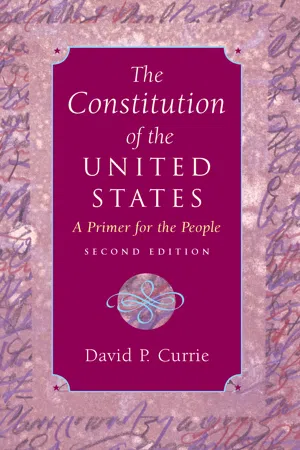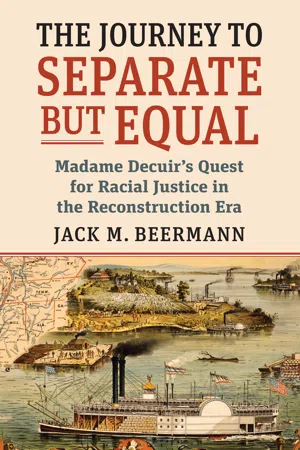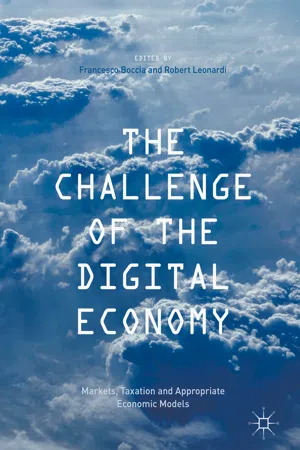Politics & International Relations
Commerce Clause
The Commerce Clause refers to a provision in the United States Constitution that gives Congress the power to regulate commerce among the states and with foreign nations. This clause has been a source of debate and controversy, as it has been used to justify a wide range of federal regulations impacting economic activity. It has played a significant role in shaping the balance of power between the federal government and the states.
Written by Perlego with AI-assistance
3 Key excerpts on "Commerce Clause"
Learn about this page
Index pages curate the most relevant extracts from our library of academic textbooks. They’ve been created using an in-house natural language model (NLM), each adding context and meaning to key research topics.
- eBook - ePub
The Constitution of the United States
A Primer for the People
- David P. Currie(Author)
- 2010(Publication Date)
- University of Chicago Press(Publisher)
without explicitly excluding the possibility of concurrent state regulation.On the basis of similar language, the Supreme Court came very early to the conclusion that the clause empowering Congress to enact “uniform laws on the subject of bankruptcies” did not forbid the states to enact insolvency laws of their own.17 The Commerce Clause could well have been read the same way: When the framers of the Constitution meant to make federal authority exclusive, they said so.18Before the Constitution was adopted, however, the states had seriously impeded interstate commerce by subjecting it to burdensome taxes and restrictions, and the purpose of the clause was to remove obstacles to interstate trade erected by state law.19 In light of this purpose the Supreme Court long ago concluded that the Commerce Clause did limit state power to burden interstate or foreign commerce through regulation or taxation.20 This was not a necessary conclusion. The text of the clause, coupled with an explicit restriction of state import or export taxes (art. I, § 10), suggests that in most cases freedom of trade was to be achieved through protective federal legislation rather than through constitutional limitations.Because the states often had legitimate interests in regulating or taxing interstate or international activities, the Court did not exclude the states from this field altogether. As a result there have been great numbers of decisions determining whether particular measures unacceptably burdened interstate or foreign commerce, and the judges have enunciated a variety of criteria for making this determination. - eBook - ePub
The Journey to Separate but Equal
Madame Decuir's Quest for Racial Justice in the Reconstruction Era
- Jack M. Beermann(Author)
- 2021(Publication Date)
- University Press of Kansas(Publisher)
The lack of centralized regulation of commercial activity was recognized as a major shortcoming of the government under the Articles of Confederation for at least two reasons; first, because state protectionist legislation impeded economic progress, and second, because it caused embarrassment in foreign relations. Foreign trading partners might be courted by the central government, which collected duties on imports, only to find that goods exported to one of the united states could not be sold due to local restrictions. This at a time when duties on foreign commerce were an important, and favored, source of federal government revenue. However, when the convention abandoned its mission of amending the articles and turned to the task of drafting an entirely new constitution, the words “sole and exclusive” no longer appeared in language granting the national government the power to regulate interstate commerce. The constitution that emerged granted Congress perpetual power “to regulate commerce with foreign nations, and among the several states, and with the Indian tribes” but said nothing about whether this power was exclusive or shared with the states. It was recognized in the period in whichHall v. Decuirwas decided, however, that the purposes of the Commerce Clause included ensuring that Congress had the power to prevent states from imposing tariffs on goods imported from other states and preventing states from discriminating against commerce from other states.3Regardless of the presence or absence of the word “exclusive” in the Commerce Clause, the scope of the federal government’s commerce power, and its relation to traditional state powers, has been one of the more vexing legal issues to arise under the Constitution. The problems have involved both the reach of federal power and in discerning a boundary, if there is one, between federal power to regulate commerce and the states’ traditional power over all manner of regulation directed at the health, safety, and welfare of the people, generally referred to as the “police power.”Fundamental principles of US federalism dictate that the states retain general regulatory power subject only to those powers explicitly delegated to the federal government in the Constitution. The problem is that many exercises of the state police power affect interstate commerce. State health and safety laws, when applied to goods produced out of state can reduce the volume and change the character of interstate commerce. Examples are simple to imagine: a state law that prohibits the sale of food products containing certain ingredients, for example, will have easily traceable effects on the fortunes of companies in other states involved in producing and selling food containing the disfavored ingredients. State laws like this may also affect the availability of goods and services in still more states as producers adjust their practices to meet regulatory burdens imposed by a few important states. If a product is banned in one state, producers may find it uneconomical to produce that product for sale, even in states where it is not banned. - eBook - ePub
The Challenge of the Digital Economy
Markets, Taxation and Appropriate Economic Models
- Francesco Boccia, Robert Leonardi, Francesco Boccia, Robert Leonardi(Authors)
- 2017(Publication Date)
- Palgrave Macmillan(Publisher)
© The Author(s) 2016Begin AbstractThe Challenge of the Digital Economy 10.1007/978-3-319-43690-6_5Francesco Boccia andRobert Leonardi (eds.)5. Federalism, E-Commerce and Public Finance in the USA
End AbstractMichael A. Pagano 1(1) College of Urban Planning and Public Affairs, Public Administration, University of Illinois at Chicago, Chicago, IL, USA5.1 Constitutional Issues and Interstate Commerce
When delegates from the first states met in 1787, as required by the Articles of Confederation, many of the delegates believed that the current constitutional arrangement provided too few, if any, powers to a centralizing authority. The delegates began to redraft a second constitution of the USA that would clearly delineate those responsibilities of the central or general government as apart and distinct from the powers that resided with the sovereign states. Among the powers of the central government included the power “To regulate Commerce with foreign Nations, and among the several States, and with the Indian Tribes.” In other words, while the federal government was granted the authority to regulate interstate commerce, state governments were explicitly denied the power to interfere with interstate commerce. Any action taken by states to regulate interstate commerce, then, would violate the Commerce Clause of the US Constitution and, therefore, be null and void.In the twentieth century, states began to expand their taxing authority from a reliance on property taxes. Taxes on retail sales eventually became an important revenue source, such that, as of today, 45 states plus the District of Columbia (the seat of the federal government) impose a general sales and use tax on goods and some services. Each state defines what constitutes an eligible good or service for taxation—for example, many states exclude food and beverages – but most tangible goods are taxed by these 45 states. The US government does not impose a general sales tax or a value added tax.


